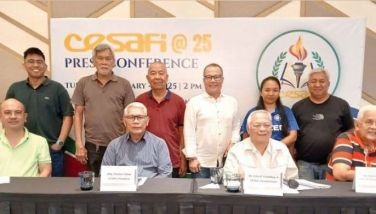Walking the plank
Protesting is, perhaps, one of the most natural forms of expression known to humans — so natural, in fact, that one might say we all began life, as protesters. “Protest” is defined as, “an expression or declaration of objection, disapproval, or dissent.” Even before we learn to speak, we let out an outraged cry in protest of being torn from our comfortable wombs. And even with the facility of language, we protest through the cues and gestures that signify our begrudging acceptance and resignation of our stations in life: the subtle raising of one’s brows, the discreet rolling of one’s eyes, or the not so subtle deep huffing and puffing to communicate—without engaging the consequences of—our displeasure.
Protests come in many shapes and sizes — from the hunger strike of Gandhi against British colonial rule to the self-immolation of Thich Quang Duc to decry the Vietnam war — but all are united in their purpose: to oppose something bigger than one’s self. The effectiveness of one’s protest action, especially in the context of the constitutional protection towards freedom of expression, is bound up with the act’s ability to impart its meaning. If the act is imbued with meaning, then it has greater potential to make an impact. Insofar as protest actions seek to convey a message, these acts are like language in that they serve very little use if they don’t make any sense.
* * * *
In the context of the 2003 U.S. invasion of Iraq, protesters resorted to “die-ins”: a veritable human diorama where people would lie on the ground and pretend to be dead. The staging’s ability to resemble the reality of the victims and casualties of war was meant to resonate with the public in a way that could make the message relatable — and thus, relevant.
Earlier this week, we were treated to a display of protest that took the form of (and took out all the fun from) “planking.”
Planking is also known as the “lying down game,” and with fairly simple rules: a person lies face-down in any unusual or popular place (the more incongruous, the better) with hands touching their sides and feet together. Then, a nearby friend takes a photograph and posts it on the internet. Players “win” by finding more original places to “plank” than their competitors. So far, people have “planked” atop street lights, police cars, and even the Taj Mahal.
But that’s just it, it’s just a game.
That is, it was until last Monday when some 20 students decided to “plank” on the street in support of the nationwide transport strike. It isn’t, however, very clear how relevant their chosen form of protest action was to the message that they wanted to convey. And in planning out their stunt, it would have been more considerate to bear in mind that, in their efforts to commiserate with the “striking” drivers, they left our commuting public a tad more miserable (and inconvenienced)- eliciting more of displeasure in their action rather than sympathy for their worthy cause.
* * * *
The other aspect to consider is the constitutionality of this form of “lying down” protest. Although protesting is protected expression, still, the same is not without limits. Our Constitution expressly stipulates that the right to petition the government for redress of greivances must be done peaceably, and jurisprudence has upheld reasonable restrictions to uphold this limitation.
Under Batas Pambansa Blg. 880, otherwise known as “The Public Assembly Act of 1985” (which sadly, is not so well-known), this right is “essential and vital to the strength and stability of the state.” For the proper exercise of this right, a written permit is generally required when organizing a public assembly in a public place. This regulation is meant to ensure, among others, the proper use of public thoroughfares and “to prevent grave public inconvenience xxx so that there will be no serious or undue interference with the free flow of commerce and trade.”
* * * *
In light of and enlightened by their respective contexts, it appears to me that there is an essential difference that distinguishes “die-ins” from “planking.” In the same way that there is a difference between “playing dead” and depicting death, the former can be done on command by any well-trained dog, while the latter commands further thought and introspection. To ask “what’s the meaning of Monday’s planking prank?” is to ask “where’s the meaning in their planking act?”
It’s bad enough that Monday’s protesters were such spoilsports that they seemed to take out all the harmless (and meaningless) fun from planking. To take them any more seriously — by criminalizing “planking”—might risk imbibing their actions with greater meaning than the nothing it already conveyed. It would be better if such students just concentrate on their studies and make sure that they don’t “plank” from school.
* * * *
Eternal Values: This week’s centavos go to First Philippine Holdings Corporation led by Chairman Emeritus Oscar M. Lopez and Chairman/CEO Federico R. Lopez for the inspiring values they outlined in their remarks during the company’s 50th anniversary celebrations. In characteristic humility, the elder Lopez began by setting the focus of his speech, “not on our achievements, but our values—not on profits, but our principles.” Indeed, these are words that all corporations would do well to heed, whether of the public or private sector. For, as Mr. Lopez emphasized to his successor and son, “assets come and go, industries rise and fall — [but] our values and principles remain.” For his part, the younger Lopez remarked that “there is no doubt in our minds that we will meet the five challenges” hurled by his father and that they WILL make him proud. The quote provided below was taken from Pikki’s speech.
* * * *
“The legacy of heroes is the memory of a great name and the inheritance of a great example.” - Benjamin Disraeli
E-mail: [email protected]
- Latest
- Trending
























